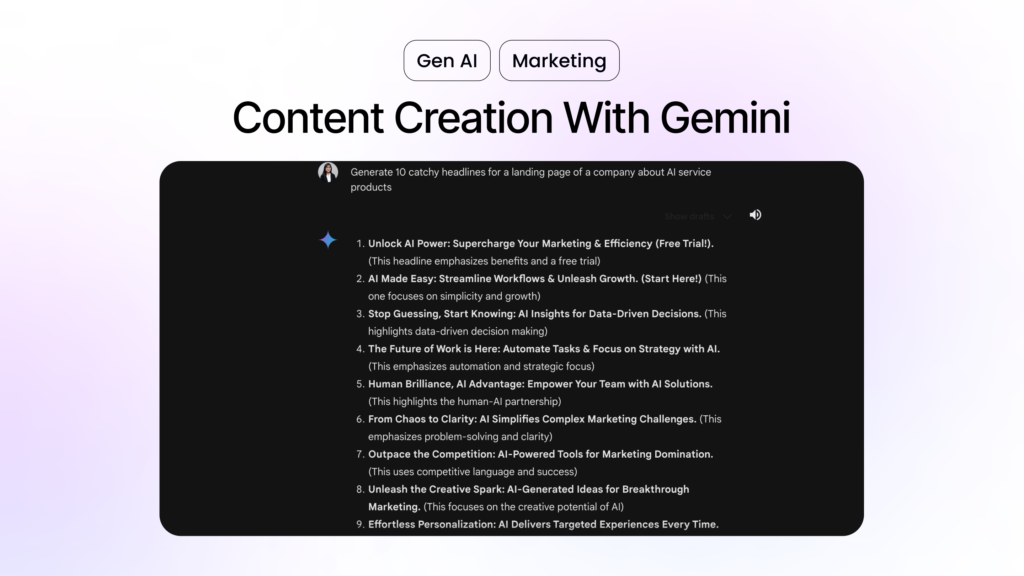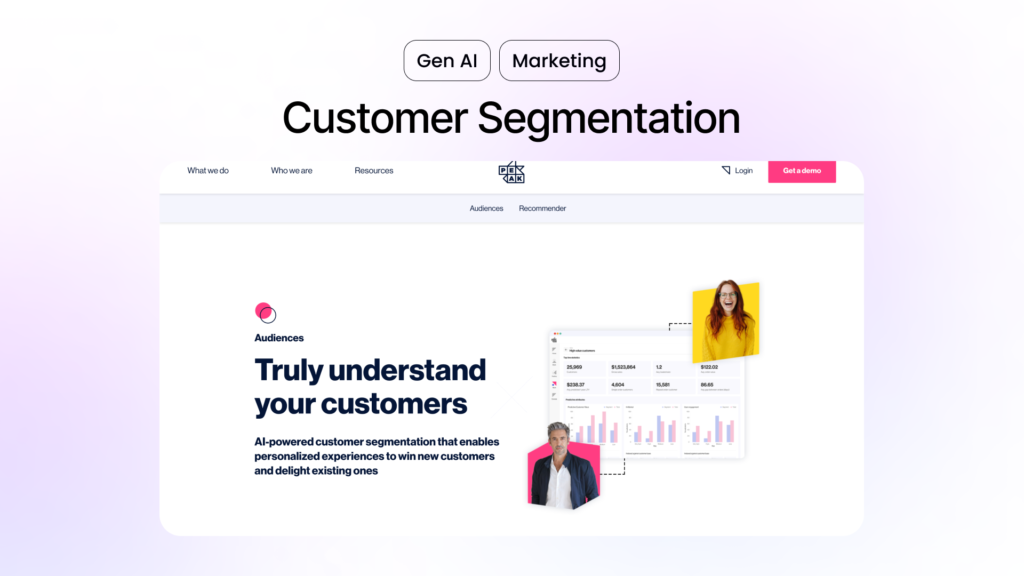Marketers are uniquely positioned to tap into Gen AI in Marketing to transform their strategies and gain a competitive edge in an era where AI is set to generate more than USD 15 trillion for the global economy by 2030.
AI’s capabilities, such as task automation, data analytics, and content generation, offer marketers opportunities to innovate and achieve goals efficiently.
Moreover, leveraging AI in marketing enhances data-driven decisions, streamlines operations, and boosts campaign effectiveness, making it essential for modern marketers.
What is Gen AI in Marketing?
AI marketing leverages data analytics, ML, and NLP to extract customer insights and make informed marketing choices automatically.
In today’s digital world, AI creates dynamic content, improves customer experiences, and provides precise marketing analytics, proving essential. Therefore, understanding AI marketing applications and practical uses across sectors is critical before incorporating AI tools into your strategy.
Uses of Gen AI in Marketing
Content Generation
The introduction of generative AI platforms like OpenAI’s ChatGPT has revolutionized content creation. By automating the production of blog posts, advertising copy, email campaigns, and website content, AI enables marketers to save significant time and resources while maintaining high-quality and relevant output for their target audience.

Audience Segmentation
Effective marketing campaigns require understanding customer differences. AI segments audiences based on demographic, psychographic, and behavioral factors. From that, AI-powered marketing enhances targeting strategies, driving engagement and ultimately driving engagement and improving ROI.

Customer Service Chatbots
AI-powered chatbots are redefining customer service by providing 24/7 assistance, resolving queries efficiently, and improving customer satisfaction rates. These chatbots ensure that customers enjoy a consistent service experience at any point in their purchasing journey.
Programmatic Advertising
AI is transforming ad buying processes by making them more efficient and contextually relevant. By analyzing customer data, AI can automate ad placements that are most likely to result in conversions, thereby increasing the effectiveness of online advertising campaigns.
Search Engine Optimization (SEO)
AI tools are instrumental in developing SEO strategies that align with the latest search engine algorithms. From keyword research to content optimization, AI assists marketers in crafting content that ranks higher in search engine results pages (SERPs), driving increased organic traffic.
E-commerce Enhancement
In e-commerce, AI is a game-changer, providing insights into customer preferences and behavior, automating tasks, and streamlining workflows. This leads to a more personalized shopping experience and higher conversion rates.
Benefits and Challenges of Gen AI in Marketing
Though the adoption of AI in marketing brings numerous advantages, including accelerated decision-making and precise KPI measurement, businesses must also navigate certain challenges. For instance, maintaining high-quality data sets for AI training and adhering to evolving privacy regulations are among the hurdles to effective AI implementation.
Benefits of Gen AI in Marketing
- Faster Decision-Making: AI platforms enable marketing teams to quickly assess the impact of their strategies and adjust tactics in real-time, offering recommendations based on extensive data analysis.
- Increased ROI: AI tools identify the most effective channels and ad placements, ensuring that marketing budgets are optimized for the best possible outcomes.
- Accurate KPI Measurement: AI-enhanced tools process vast amounts of campaign data, linking specific tactics to their results and helping marketers refine their approaches for better success.
Challenges of Gen AI in Marketing
- Data Quality and Privacy: Ensuring that AI systems are trained on high-quality, diverse data sets is essential for their accuracy. Additionally, marketers must remain vigilant regarding customer data privacy and comply with stringent regulations.
- Customer Trust and Transparency: Gaining customer trust is vital, especially when using AI-driven personalization. Marketers should be transparent about AI’s role in their campaigns to build and maintain customer trust.
Integrating Gen AI into Your Marketing Campaign: A Step-by-Step Guide
- Define Your Goals: Begin by precisely defining your objectives for leveraging AI in marketing. Identify whether you aim to increase engagement, enhance segmentation, boost conversion rates, or both. Setting clear, measurable goals guides the selection of AI tools, ensuring alignment with desired outcomes.
- Choose the Right AI Tools: Thoroughly research to pinpoint AI technologies aligned with your marketing goals. This may include content generation, customer insights, or programmatic advertising. After that, choose technologies aligning with objectives and integrating seamlessly with existing marketing stack.
- Train Your Team: Your marketing team must be proficient in using the selected AI tools. First, organize comprehensive training sessions that cover both the theoretical aspects of AI in marketing and hands-on experience with the tools. Then, you can provide access to ongoing learning resources and support that will empower your team to effectively leverage AI capabilities, enhancing campaign outcomes.
- Monitor and Adjust: Harness AI’s analytical power to continuously track and evaluate the performance of your marketing campaigns. First, start by utilizing AI-driven analytics to gain insights into campaign effectiveness, customer behavior, and market trends. Then, be prepared to swiftly adjust your marketing strategies based on these insights, optimizing for maximum performance and ROI. This iterative process is key to staying ahead in a dynamic market environment.
- Evaluate and Scale: After implementing AI in your marketing campaign, take time to assess its impact carefully. Analyze KPIs to measure success against initial goals. Identify aspects of AI integration that yielded positive results and areas needing refinement. Based on this evaluation, consider expanding AI to other marketing operations, leveraging its full potential for growth and innovation.
Leveraging Generative AI In Marketing
Incorporating AI into your marketing strategies is not just about staying current with technological advancements; it’s about transforming the way you engage with your audience, making data-driven decisions, and optimizing your marketing efforts for maximum impact.
As you venture into the realm of AI-enabled marketing, remember that success requires a blend of strategic planning, continuous learning, and adaptability. By following the outlined steps and fostering a culture of innovation within your team, you can unlock unprecedented opportunities for growth and establish a competitive edge in today’s fast-paced market.
Keep exploring, experimenting, and evolving your tactics to harness the full power of AI in your marketing endeavors.






